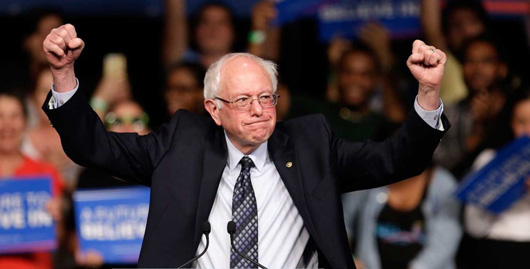
Speaking in Grand Rapids, Mich., on the eve of yesterday’s Democratic Party presidential primaries in Michigan and Mississippi, Hillary Clinton said she and Bernie Sanders have differences but that they “pale” in comparison with the differences they both have with the Republican presidential nominee contenders.
“The kind of bluster and bigotry and bullying that we’re seeing [among the Republicans] is a terrible example for leadership, it’s a bad example for kids,” Clinton said.
As expected, she won the Mississippi primary by a huge margin.
All pundits and pollsters had predicted that Clinton would also win in Michigan by double digits. Instead, Sanders won by two percentage points.
“The peoples’ revolution, the political revolution,” is spreading, Sanders said.
Observers commented that voters for both Clinton and Sanders in Michigan had a positive reaction to the term “democratic socialist.”
The voters made their decision based on which candidate they believed would be best for Michigan’s economy.
Michigan still suffering from auto industry desertion
In the 1960s, Michigan was one of the nation’s most prosperous states. On average, people in their 20s were earning more than their peers anywhere in the country. Today, people of all ages in Michigan are either unemployed, underemployed or are working longer hours for less pay than they did in the recent past.
The reason: auto manufactures have deserted. Not because their profits were low; they were up. They deserted Michigan because, as Sanders said, “they could avoid paying taxes and could pay workers starvation wages” by moving to Mexico and Asia.
Many Michigan residents lost their jobs, their homes and hope for the future.
Exit polls yesterday showed that voters in the Democratic primary looked past the campaign rhetoric of the two candidates and judged each of them by their past and present records of opposition to the U.S. tax policies and trade deals that caused Michigan’s economic downturn.
Improvements in the lives of working people have been hindered by Republican Party control of both houses of Michigan’s legislature and by Rick Snyder, Michigan’s Republican governor.
Instead of programs to relieve poverty, improve education and create jobs, Snyder pushed through legislation to weaken workers’ rights and to mandate what many Michiganders call “marshal law.”
Under Public Act 436 of 2012, Gov. Snyder has the power to unilaterally appoint an “emergency manager” to run any municipality. These managers have what amounts to absolute authority. Their orders supersede any policies or programs put in place by officials elected by residents.
Republicans ignore Flint poisoning
Snyder sent an “emergency manager” to Flint, a city that had flourished for close to 80 years until General Motors started to move its manufacturing facilities abroad in the early 1990s.
To save about $100 per resident, Snyder ordered that Flint’s water supply be switched from Lake Huron to the highly polluted Flint River. The manager objected, but was overruled by Snyder.
The pipes going from the river to the kitchens and bathrooms of Flint residents were corroded but officials did nothing to stop poisonous lead from leaching into the water. Residents, especially children, began to suffer a myriad of illnesses.
In response to the crisis in Flint, Republican presidential contenders spent a total of 30 seconds in their last debate in effect saying “tsk, tsk” and coming out with a few clichés. Instead they engaged in a veiled (thank God) debate about the size of Donald Trump’s genitals. Some viewers feared they’d take out a ruler to measure.
On the other hand, both Clinton and Sanders, in their debate, measured the extent of the damage done to the people of Flint from drinking water containing lead. Previously, both candidates had gone to Flint and helped set up distributions of fresh water.
Moreover, the most telling difference between the Republican and Democratic responses to the Flint crisis was this: Clinton and Sanders held their debate in Flint itself, where residents could talk directly to each candidate.
Primary results
Like the Democrats, the Republicans also held primaries in Mississippi and Michigan. In addition, there was a Republican caucus in Hawaii and a primary in Idaho.
Once again, Donald Trump was the big winner.
For reasons known only to Trump, at his victory speech he displayed or talked about Trump wine, Trump water, steaks, and other Trump products.
Although Sanders won in Michigan, he gained only 69 delegates to Clinton’s 86. The final count of delegates in still not available, but in total, Clinton now has about 1,215 delegates pledged to support her at the upcoming Democratic Party National Convention, including 458 super delegates who are not elected in primaries or caucuses but who are recognized by the Democratic National Committee. Sanders has about 567 delegates, including 22 super delegates.
Some Democratic Party activists have said they are launching a campaign to have all delegates elected.
Meanwhile, in her speech March 8 in Grand Rapids Clinton once again praised Sanders for inspiring many young people and workers to get involved in the political process.
She said that after the primaries, to win the general election will take a “tough fight.”
“If I’m fortunate enough to win the nomination,” she concluded, “I hope that many of Bernie Sanders’ supporters will help out.”
Clinton cited the fact that a Republican win would be disastrous for America.
Photo: AP










